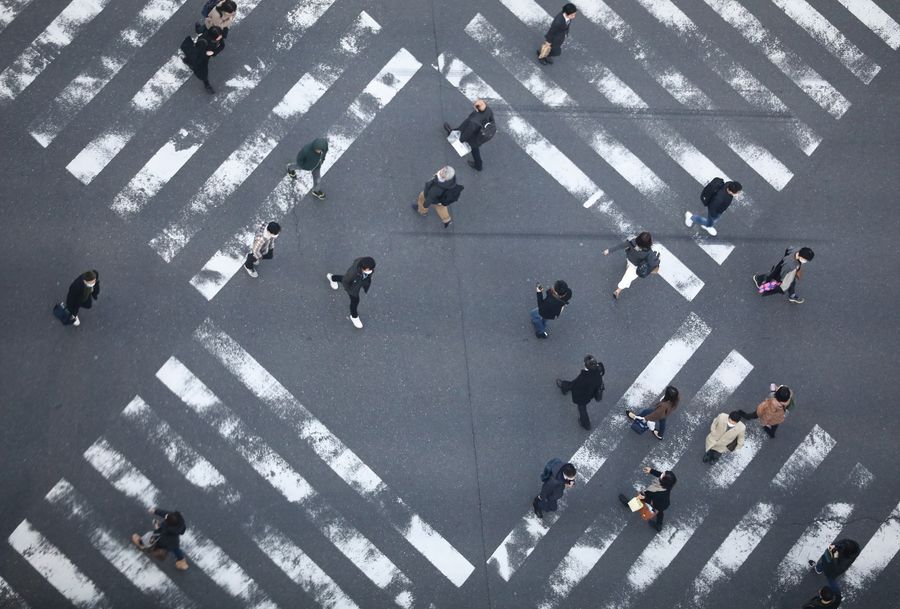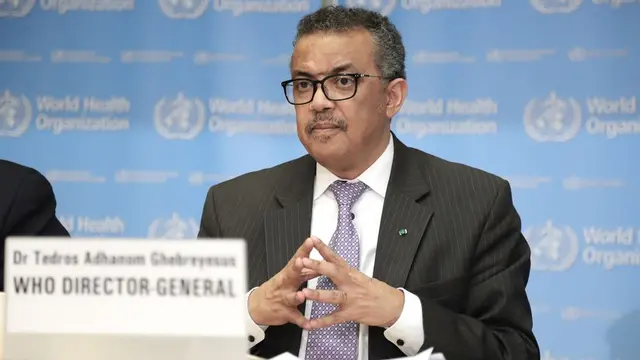
World Health Organization Director-General Tedros Adhanom Ghebreyesus speaks at a daily briefing in Geneva, Switzerland, March 9, 2020. /Xinhua
**Editor's note: **Bradley Blankenship is a Prague-based American journalist, political analyst and freelance reporter. The article reflects the author's opinions, and not necessarily the views of CGTN.
In an opinion piece published in the
Independent
on September 29, Director-General of the World Health Organization (WHO) Dr. Tedros Adhanom Ghebreyesus shared a message of hope as the world crosses the difficult milestone of one million COVID-19 deaths.
As the virus continues to ravage certain areas, and reemerges in others, the WHO's top official shared some glimmers of optimism, saying that "it's never too late to fight back."
Dr. Tedros, as he prefers to be called, notes that the world's top scientists have developed tests, identified effective treatments and produced successful vaccine candidates that are now in final phase three trials. He praised many countries that were able to effectively contain the disease by putting their health infrastructure to proper use and wielding the full power of "an all-of-government, all-of-society response."
He goes on to list "four essential steps" to control the virus, which have long been in the repertoire of public health officials to contain diseases. These are avoiding events where the virus can most easily spread, protecting vulnerable groups, observing social-distancing and hygiene standards and "tailored actions to find, isolate, test and care for cases, and trace and quarantine contacts."
Here I believe is the real lesson of the novel coronavirus – it is both novel (new) and a virus, something humans have dealt with since time immemorial. It requires both a sound implementation of tried and tested public health measures that have worked successfully in the past and wholly new approaches to this specific virus in the context of the modern day.
This is evident by the fact that almost every measure implemented by governments runs the risk of having deleterious economic effects, which is a serious concern. Governments in Europe now experiencing their second wave of the virus are trying the best they can to avoid another lockdown that would seriously hinder economic recovery even further.
This is not exactly new – restrictions during past pandemics obviously had an impact on economies, but the globalized economy of today, dominated by speculative finance capital that hinges on calculated certainty, faces a serious risk.
This is precisely why, as Dr. Tedros notes, "the choice is not between controlling the virus or saving the economy; the two go hand-in-hand."
Once managed, localized measures can be taken to avoid nationwide lockdown measures and prevent serious economic disruption. To make this work seamlessly, it will take public trust.

Pedestrians wearing masks walk in the street at Ginza in Tokyo, Japan, March 6, 2020. /Xinhua
Just as many of our approaches are not new, problems in public trust resulting from the pandemic are also not new. As many are now resisting public health measures, such as wearing masks, observing social distancing and adhering to movement restrictions, people had done so in the past. Skepticism around the usage of vaccines has also been around just as long as vaccines have. Needless to say, public trust in public health is an ongoing challenge, but one that can be overcome – history tells us.
Maintaining this trust requires transparency from governments, clear expectations, reverence for the scientific process by politicians and recognition of the fact that we are all together in this historically comparable yet deeply exceptional time. Taking it seriously requires both a look back through our history for hope and also grasping how uncertain the future is.
We cannot allow ourselves to accept today as the new normal –it is not normal and the vast majority of people alive today have experienced nothing like this. A deadly virus has now claimed one million lives around the world –real people of all ages with lives as lucid as anyone else's.We must not be passive to this immense loss of human life.
It's important to bear in mind that it is actually a testament to the state of our technology that this number is not far higher, as it is estimated that one in five people who catch the virus require medical intervention. Even decades ago we may not have been able to even fathom managing such a serious disease.
Even those that recover from mild cases face an uncertain future in returning to their prior health state. We must understand that it is a danger not only posed to our most vulnerable, who are indeed people just like us, but to each and every one of us – an important fact that requires deep reflection as our mettle is tested yet again.
This autumn in the Northern Hemisphere, where approximately 90 percent of the world's population lives, will depend on our solidarity. As Dr. Tedros concluded in his piece, "History will judge us on the decisions we do and don't make in the months ahead. Let's seize the opportunity and bridge national boundaries to save lives and livelihoods."
Many across the world are feeling hopeless and alienated because of the pandemic and many more are frustrated and fatigued. For all of this alienation, technology and the general advancements of the 21st century have brought us closer in ways previously unthinkable. We have the capability to bridge interpersonal and international gaps in order to pull through this, and the realization of our collective danger ought to be the impetus to achieve common goals in the future.
(If you want to contribute and have specific expertise, please contact us at [email protected].)
 简体中文
简体中文

